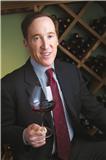 Adam Strum is the Founder and Chairman of Wine Enthusiast Companies and Editor and Publisher of Wine Enthusiast Magazine and heads up the largest group of wine commerce and media companies in the world. With more than 800,000 readers Wine Enthusiast Magazine and its Web site Winemag.com provide editorial content and authoritative reviews and ratings of tens of thousands of wines every year. The Wine Enthusiast Catalog/Web business is the world’s leading inventor and seller of wine accessories and wine storage. Strum, a second-generation, 35-year veteran of the wine business, is a pioneer whose multi-faceted wine-related businesses have had a major impact on increasing wine consumption and wine culture in America. Since 1979 Wine Enthusiast Companies has mailed and distributed more than 300 million wine-related publications in the United States and around the world. Not bad for a husband and wife team who started a mail-order business in their attic.
Adam Strum is the Founder and Chairman of Wine Enthusiast Companies and Editor and Publisher of Wine Enthusiast Magazine and heads up the largest group of wine commerce and media companies in the world. With more than 800,000 readers Wine Enthusiast Magazine and its Web site Winemag.com provide editorial content and authoritative reviews and ratings of tens of thousands of wines every year. The Wine Enthusiast Catalog/Web business is the world’s leading inventor and seller of wine accessories and wine storage. Strum, a second-generation, 35-year veteran of the wine business, is a pioneer whose multi-faceted wine-related businesses have had a major impact on increasing wine consumption and wine culture in America. Since 1979 Wine Enthusiast Companies has mailed and distributed more than 300 million wine-related publications in the United States and around the world. Not bad for a husband and wife team who started a mail-order business in their attic.
Much has been written and debated concerning the 100-point rating scale. Some say it has empowered consumers, others claim it has distorted wine prices, while still others say it has actually changed the quality of wines being produced. What do you see as being the long term impact of the 100 point rating system?
Very, very beneficial! Wine is an esoteric subject like art, music and theater, and consumers generally need direction. The 100-point system, while not perfect, is a great communication tool that provides market intelligence to consumers who mostly have grown up being graded in school on a 100-point system. American wine purchasers in particular understand the scores and what they stand for so critics who have knowledge of wine styles can provide their opinions about the relative merits of any wine quickly with this 100-point methodology. Wine producers are trying to upgrade their quality since they know there are critics who will reward their good efforts with high scores and great reviews. Just like critics in the art, music and theater fields, wine critics and the 100 point scale are here to stay.
Your magazine and others have capitalized on the public’s fascination with wine, its mystique and allure. The average consumer still feels intimidated by wine and wine-speak. Are magazines like yours partly responsible for the prevalent feeling among consumers that wine is somehow beyond their comprehension?
Absolutely the opposite is true as it relates to Wine Enthusiast Magazine. We make every effort to demystify wine and never make unwarranted assumptions about what the reader might or might not know. We make wine accessible, it’s one of our primary missions, which we achieve with fun, user-friendly articles, ratings and reviews.
Rising wine alcohol levels in U.S. and foreign wines are a hot topic these days in wine circles. What are your thoughts on the subject?
I personally do not enjoy wines that are so rich I can’t match them with food. This is often the case with these over-the-top alcohol blockbusters. Recently I tasted Pinot Noir and Zinfandel that were more like Port. I don’t think it’s a positive trend since the alcohol masks the fruit in the wine.
What have been the significant changes you have noticed in the wine business since you started Wine Enthusiast Companies?
The most compelling thing I can say is that the culture - beverage, culinary, and other aspects of the culture surrounding them - in the U.S. dramatically changed, and America evolved into a wine-drinking nation. Robert Parker’s introduction of the 100-point scale, the French Paradox story on “60 Minutes,” which associate wine with health, the explosion in restaurant quality and variety, and the proliferation of wine’s appearance in movies, television and advertisements helped to propel this esoteric drink into the mainstream. In the late 1980s more and more producers put the varietal name of the grape on the bottle, which made it easier for the consumer to understand what they were drinking. Wine Enthusiast shipped millions of corkscrews via catalogs in the 1980s and 1990s and made one of the biggest impediments to enjoying wine (pulling a cork) an easier process. I could go on and on but the changes have been more than evolutionary they have been revolutionary.
Is the role of the sommelier over rated in today’s wine savvy public?
Often, brands are made in the on-premise environment, so if you have a particularly passionate wine person at a restaurant recommending a certain wine it can have an impact on the local off premise. Overall, though, their role is not that powerful in the big picture of making brands. But in terms of making inexperienced customers feel more comfortable with wine, certainly. On the very high end where “hand selling” rules, yes, a knowledgeable sommelier is instrumental to helping even sophisticated diners make decisions.
Can anyone build a good wine collection, and enjoy it, without all the peripheral accoutrements of items you and others sell?
Well of course anyone can buy a bottle of wine with a screw-cap, unscrew it and pour it in a “Dixie Cup.” However if you do collect fine wine you need to protect it, so the proper conditions are essential for long-term storage: A wine cellar that maintains 55 degrees and 70 % humidity protects your bottles, helps the wine mature properly and predictably, and makes it more delicious when you eventually consume it. I believe everyone needs a good corkscrew, an aerator to soften the tannins in most wines and a preserver like a vacuum pump in case you don’t finish a bottle. Fine glassware and decanters enhances the experience when you enjoy wine. So obviously the answer is that wine storage and the accessories help dramatically when you become a wine lover.
With the wine industry saturated with magazines, blogs, books and websites, what do you see as the future of wine journalism?
I don’t see the “industry” saturated at all and certainly not with magazines. Wine Enthusiast Magazine’s circulation has grown more than 60% in the last 18 months. There certainly are a few good bloggers our there and I enjoy their writing; however, their traffic is miniscule and I don’t think they move the marketplace at all. Mainstream wine journalism is doing just fine and I personally enjoy reading anyone who writes positively about wine. I do, however, think the “bloom is off the rose” for wine bloggers—they work so hard for little or zero pay. I’m perceiving a fall in the sheer number of bloggers. For those still standing: why do they do it? I suppose because they are passionate about wine. This is wonderful news as far as I am concerned. At Wine Enthusiast we have a powerful brand and incredible journalists who are headquartered in Rome, Bordeaux, San Francisco, Seattle and New York and have their hands on the pulse of their region’s wine beat.
Crafting a wine is a subjective thing. But should winemakers and wineries peruse critical scores from the national wine press as a means of competing in the current marketplace and to please a broader range of palates?
Well, it stands to reason that wines with higher scores, if priced correctly, will sell better in the marketplace. Our ratings and reviews resonate with not only the consumers but also with restaurateurs and retailers who are the decision-makers that can propel a wine to “stardom.” So as a winemaker, I want to keep my job, I want people to enjoy my wines. It makes sense for them to at least read the reviews, and the remarks. But that’s not to say that they should make wine to please critics, to get the high scores. Even if I thought that was possible, I wouldn’t advise it. We all put our lives on the line everyday we roll out of bed and so we have to have the confidence that what we do is good.
Assuming everyone owns a corkscrew, what would be the one accessory that any wine lover should never be without?
It really depends on who you are. If you are single living alone you probably need a wine preserver so you don’t drink an entire bottle of wine every night. If you serve big rich wines you probably need an aerator that, amazingly, instantly improves and changes the complexity of your wine. If you are collecting wine for long-term purposes you need temperature-controlled wine storage. So you see it depends on what type of wine lover you are.
What is the best part of your business?
“Best” meaning largest and most profitable? Then, hands down, it is our commerce business, which represents 70% of our sales and was the founding business we were engaged in. “Best” meaning most gratifying, I would have to say it is our media business which allows me to interact with all of the fascinating people in the wine world. “Best” meaning the most fun then it would be our events businesses, where I meet real wine consumers and enjoy a wine and great restaurant tasting in exciting cities in spectacular cultural venues.






